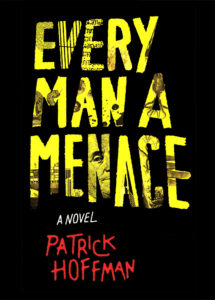
From PI to crime novelist
Originally published on GQ.com, by Kevin Nguyen***
Patrick Hoffman is a uniquely qualified crime novelist: by day, he’s a private investigator, assisting criminal defense attorneys for jobs that take him to the outer reaches of all five of New York’s boroughs. Digging up people also takes him to the less interesting reaches of the internet, like Facebook and LinkedIn, the sort of desk work is what gets left out when Hoffman’s profession is depicted by the likes of Law & Order. But all in all, it’s a dirty job that involves knocking on doors and tracking people down—and it’s often people that don’t want to be found.
Hoffman told us how he got started in the Bay Area, how his work influences his novels and the paranoia that comes with being a PI.
 How did you become a PI?
How did you become a PI?
I was working as a taxicab driver in San Francisco, which was fun, but I wanted to find a more meaningful job. A friend of mine guided me toward an internship at the San Francisco Public Defender’s office. I interned there for six months (and continued driving the cab at night), and then got hired by a legendary San Francisco private investigator named Tim O’Brien. In the job interview he asked me to name my favorite Russian novelists and nodded his head skeptically while I went on and on about Mikhail Lermontov. On the first day of the job, he had me go try and find some farmer in Stockton. I was so inexperienced that I didn’t know that I should do all my homework first. This was before smartphones. I drove my 1984 Volkswagen GTI to Stockton. All I had was a name, one address, and a paper map. The guy wasn’t at the address, but I kept asking questions, and followed tips from place to place until, a few hours later, I found him working at a restaurant. He talked to me in the parking lot. That was my first paid day.
So what kind of PI work do you do now?
I get hired by criminal defense attorneys to assist on their cases. I also do a lot of work for civil rights attorneys who are suing prosecutors and police for misconduct after our clients have been exonerated. It’s very gratifying.
What are your days like now?
My days are split between desk work and field work. When I’m at the desk, I’m reviewing documents—some of the murder cases I work on can have tens of thousands of pages of discovery, and hundreds of hours of recorded phone calls (stop talking on the phone people!). I also spend a lot of time trolling through databases looking for addresses, court records, criminal histories. I look at people’s Facebook and LinkedIn profiles, take screen grabs of their photos— you know, snooping around. The field work is more fun, it’s when I go out and try to talk to people. I usually don’t announce that I’m coming. I just show up. These interviews can happen in all types of crazy places. One time in San Francisco I had to find a homeless guy named Big Nose Al in an abandoned factory in Hunters Point. I had to break into the place. It looked like the set of a Freddy Krueger movie. I found him on the third floor and talked to him for an hour.
How is being a PI different than what people might expect?
People always ask if I do stakeouts and if I take pictures of cheating wives. I have done a very little bit of that in the past, but now I pretty much only work on criminal cases. When I tell them I work on criminal cases, they probably picture a story like the Big Nose Al one. They don’t generally think about the hours and hours and hours of looking through databases and court records. Also, I think shows like Law & Order and The Good Wife have created this mythical world where every witness is at home and ready to talk. The truth is nobody is ever home, the addresses aren’t accurate, and a lot of places don’t even have door buzzers that work. They also don’t realize how much of the job is like a sales job—you’re just constantly trying to get people to talk to you. It’s fun but exhausting.
What is the craziest thing that has happened on the job?
Even non-eventful incidents like stopping by someone’s house can feel crazy. Once, I was looking for a witness in a grisly murder case. The guy I was looking for was from a very drug-connected family in Oakland. I was stopping by his uncle’s house to see if anybody knew where he was. A huge guy was working on a car in the front yard. I asked him if so-and-so was around. The guy, holding a large wrench, just stared at me and didn’t answer. I said, “Okay… so… I guess I’ll just go knock on the door if that’s alright with you?” He didn’t say anything. My walk to the door led me past a pair of pit bulls trying to break free from their chains. The door itself, like most doors in East Oakland, was metal and fortified. When I knocked I could see the shadows of moving people inside the house. Finally, when the door opened, a friendly older guy told me his nephew wasn’t around, and he didn’t know where he was. When I turned to leave, I saw that three cars had pulled up in front of the house. Two men sat in each car. All eyes were on me.
But that’s just a normal incident, nothing even happened. The feeling of craziness has a lot to do with where I’m investigating. This year, I went to Guyana to work on a cocaine smuggling case. I had to go around secretly taking pictures of this branch of the police called the “Black Clothes Police.” They dress in all black. I also had to take video of other locations where this cocaine conspiracy was going down. There was definitely a time when I jumped in a cab that I had waiting for me, and did the whole “go, go, go!” thing.
I gotta keep it real though: It’s not that exciting most of the time. I can be my own worst enemy, too. Once, I thought it would make more sense to look for some homeless people in San Francisco on bicycle instead of with a car. On the way back to the office. I cut through a construction site and didn’t see a pit of wet concrete. I flew over the handlebars and landed face first in eight inches of wet concrete. I was literally covered head-to-toe in it. It was the consistency of a milkshake. I had to stand at one of the busiest intersections in San Francisco and get hosed off by a construction worker for ten minutes. People were taking pictures of me. It was humiliating.
You’re also a crime novelist. How did your job inform your two books?
My job has been so helpful with the writing. Over the last twelve years, I’ve had to write hundreds of reports. I’ve interviewed thousands of people. I’ve probably listened or watched close to a thousand hours of police interrogations. I’ve hung out with gangsters, alleged murderers, thieves, crooked cops, cheating prosecutors, heroic defense attorneys, good and bad judges. I’ve visited countless jails and prisons. I get to examine evidence in evidence rooms, read autopsy reports, visit crime scenes. It can be stressful, but it is definitely good for the crime writing.
Patrick Hoffman is the author of The White Van and Every Man a Menace*, available this October.*

